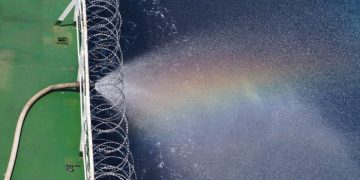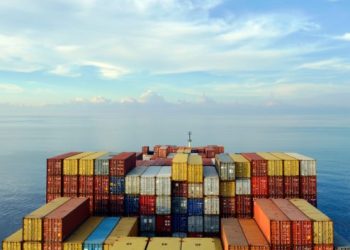Shipping continued its long-term positive safety trend over the past year but Russia’s invasion of Ukraine, the growing number of costly issues involving larger vessels, crew and port congestion challenges resulting from the shipping boom, and managing challenging decarbonization targets, means there is no room for complacency, according to marine insurer Allianz Global Corporate & Specialty SE’s (AGCS) Safety & Shipping Review 2022.
Key highlights
- 54 large ships lost worldwide last year.
- Total losses down 57% over past decade.
- South China, Indochina, Indonesia, and the Philippines top loss location. British Isles sees most shipping incidents.
- Ukraine invasion has multiple impacts: loss of life/vessels, exacerbation of crew crisis, trade disruption, sanctions burden, and cost and availability of bunker fuel.
- Fires, container ship and car carrier incidents leading to oversized losses and ‘general average’ process becoming more frequent.
- Sustainability concerns driving up costs of salvage and wreck removal.
- Decarbonization of shipping industry creating new risks.
- Shipping boom safety impact: growing use of non-container vessels to carry containers, working life of vessels being extended, port congestion putting crews and facilities under pressure.
The annual AGCS study analyzes reported shipping losses and casualties (incidents) over 100 gross tons. During 2021, 54 total losses of vessels were reported globally, compared with 65 a year earlier. This represents a 57% decline over 10 years (127 in 2012), while during the early 1990s the global fleet was losing 200+ vessels a year.
[smlsubform prepend=”GET THE SAFETY4SEA IN YOUR INBOX!” showname=false emailtxt=”” emailholder=”Enter your email address” showsubmit=true submittxt=”Submit” jsthanks=false thankyou=”Thank you for subscribing to our mailing list”]
The 2021 loss total is made more impressive by the fact that there are an estimated 130,000 ships in the global fleet today, compared with some 80,000 30 years ago. Such progress reflects the increased focus on safety measures over time through training and safety programs, improved ship design, technology and regulation.
The tragic situation in Ukraine has caused widespread disruption in the Black Sea and elsewhere, exacerbating ongoing supply chain, port congestion, and crew crisis issues caused by the Covid-19 pandemic
says Captain Rahul Khanna, Global Head of Marine Risk Consulting at AGCS. Meanwhile, the increasing number of problems posed by large vessels, such as fires, groundings and complex salvage operations, continue to challenge ship owners and their crews, Captain Khanna adds.
According to the report, there have been almost 900 total losses over the past decade (892). The South China, Indochina, Indonesia, and the Philippines maritime region is the main global loss hotspot, accounting for one-in-five losses in 2021 (12) and one-in-four-losses over the past decade (225), driven by factors including high levels of trade, congested ports, older fleets, and extreme weather.
Globally, cargo ships (27) account for half of vessels lost in the past year and 40% over the past decade. Foundered (sunk/submerged) was the main cause of total losses over the past year, accounting for 60% (32).
While total losses declined over the past year, the number of reported shipping casualties or incidents rose. The British Isles saw the highest number (668 out of 3,000). Machinery damage accounted for over one-in-three incidents globally (1,311), followed by collision (222) and fires (178), with the number of fires increasing by almost 10%.
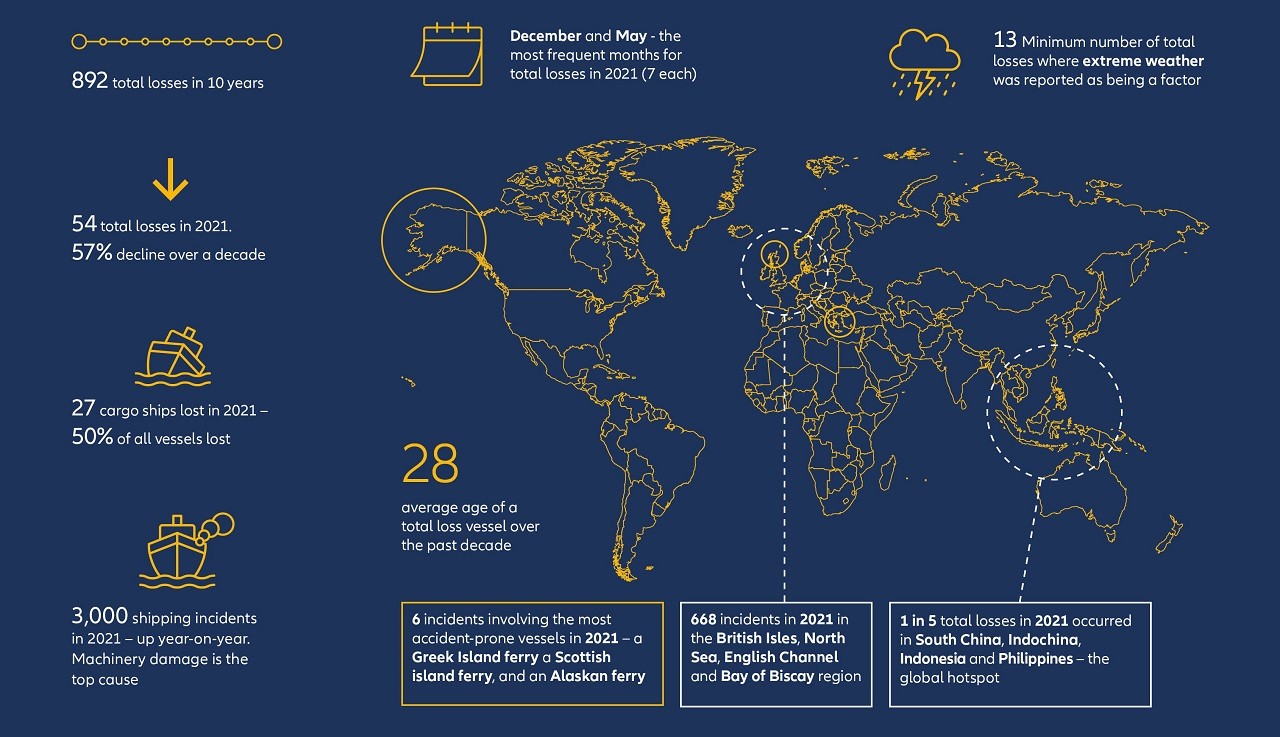
Ukraine impact: safety and insurance
The shipping industry has been affected on multiple fronts by Russia’s invasion of Ukraine, with the loss of life and vessels in the Black Sea, disruption to trade, and the growing burden of sanctions. It also faces challenges to day-to-day operations, with knock-on effects for crew, the cost and availability of bunker fuel, and the potential for growing cyber risk.
The invasion has further ramifications for a global maritime industry already facing shortages. Russian seafarers account for just over 10% of the world’s 1.89 million workforce, while around 4% come from Ukraine. These seafarers may struggle to return home or rejoin ships at the end of contracts.
Meanwhile, a prolonged conflict is likely to have deeper consequences, potentially reshaping global trade in energy and other commodities. An expanded ban on Russian oil could contribute to pushing up the cost of bunker fuel and impacting availability, potentially pushing ship owners to use alternative fuels. If such fuels are of substandard quality, this may result in machinery breakdown claims in future. At the same time, security agencies continue to warn of a heightened prospect of cyber risks for the shipping sector such as GPS jamming, Automatic Identification System (AIS) spoofing and electronic interference.
The insurance industry is likely to see a number of claims under specialist war policies from vessels damaged or lost to sea mines, rocket attacks and bombings in conflict zones. Insurers may also receive claims under marine war policies from vessels and cargo blocked or trapped in Ukrainian ports and coastal waters
explains Justus Heinrich, Global Product Leader, Marine Hull, at AGCS.
A burning issue: fires on board
During the past year, fires on board the roll-on roll-off (ro-ro) car carrier Felicity Ace and the container ship X-Press Pearl both resulted in total losses. Cargo fires are indeed a priority concern. There have been over 70 reported fires on container ships alone in the past five years, the report notes.
Fires often start in containers, which can be the result of non-/mis-declaration of hazardous cargo, such as chemicals and batteries – around 5% of containers shipped may consist of undeclared dangerous goods. Fires on large vessels can spread quickly and be difficult to control, often resulting in the crew abandoning ship, which can significantly increase the final cost of an incident.
Fires have also become a major loss driver for car carriers. Among other causes, they can start in cargo holds, caused by malfunctions or electrical short circuits in vehicles, while the open decks can allow them to spread quickly. The growing numbers of electric vehicles (EVs) transported by sea brings further challenges, given existing counter-measure systems may not respond effectively in the event of an EV blaze. Losses can be expensive, given the value of the car cargo and the cost of wreck removal and pollution mitigation.
When large vessels get into trouble, emergency response and finding a port of refuge can be challenging. Specialist salvage equipment, tugs, cranes, barges and port infrastructure are required, which adds time and cost to a response.
In addition, higher salvage costs, along with the burden of larger losses more generally, are a cost increasingly borne by cargo owners and their insurers. “’General average’, the legal process by which cargo owners proportionately share losses and the cost of saving a maritime venture, has become a frequency event, as well as a severity event, with the increase in the number of large ships involved in fires, groundings and container losses at sea compared with five years ago,” explains Régis Broudin, Global Head of Marine Claims at AGCS.
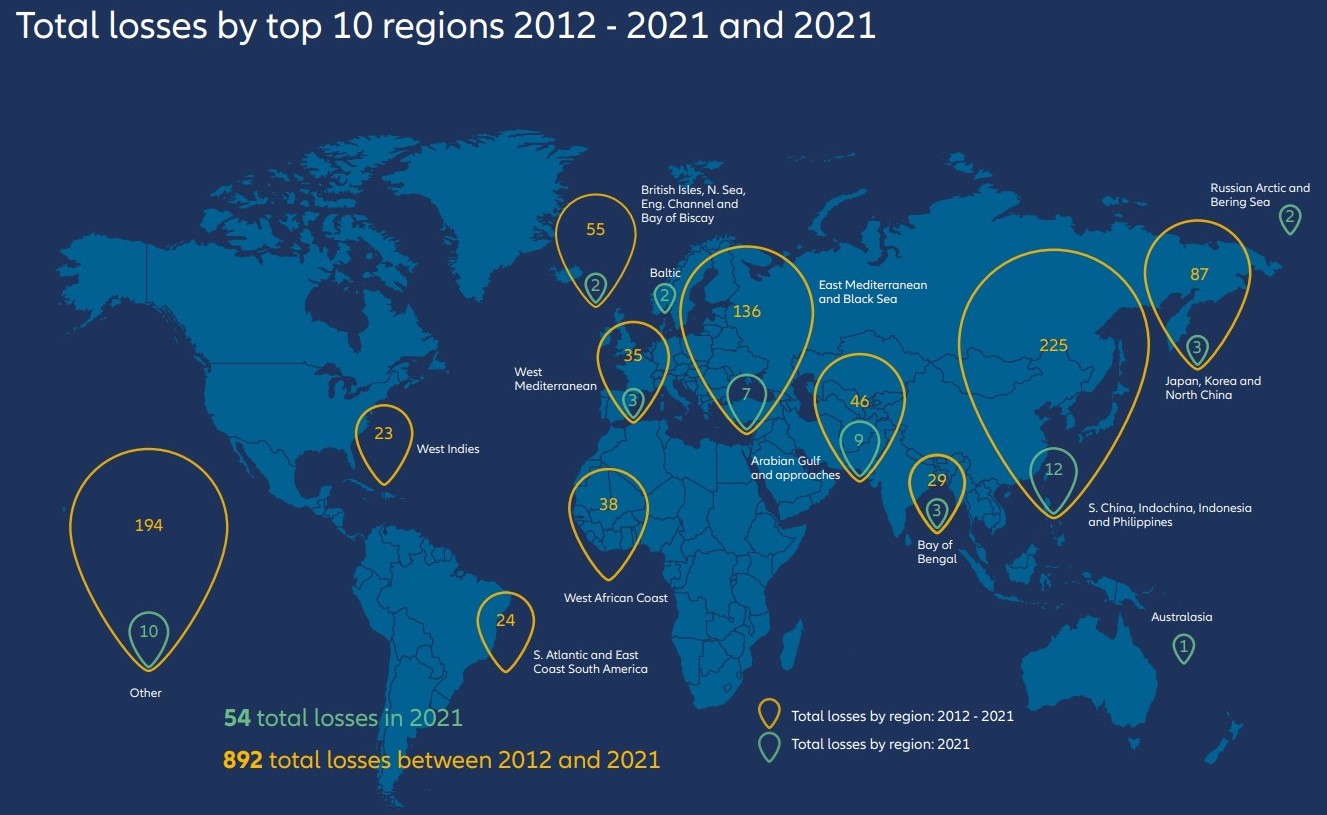
Post-pandemic world brings new risk challenges
While the Covid-19 pandemic resulted in few direct claims for the marine insurance sector, the impact on crew welfare and the boom in shipping and port congestion raises potential safety concerns. Demand for crew is high, yet many skilled and experienced seafarers are leaving the industry. A serious shortfall of officers is predicted within five years.
For those who remain, morale is low as commercial pressures, compliance duties and workloads are running high. Such a work situation is prone to mistakes – 75% of shipping incidents involve human error, AGCS analysis shows.
The economic rebound from Covid-19 lockdowns has created a boom time for shipping, with record increases in charter and freight rates. While this is a positive for shipping companies, higher freight rates and a shortage of container ship capacity are tempting some operators to use bulk carriers, or consider converting tankers, to transport containers. The use of non-container vessels to carry containers raises questions around stability, firefighting capabilities, and securing cargo. Bulk carriers are not designed to carry containers, which could impact their maneuvering characteristics in bad weather, and crew may not be able to respond appropriately in an incident.
With demand for shipping high, some owners are also extending the working life of vessels. Even before the pandemic, the average age of vessels was rising. Although there are many well-managed and maintained fleets composed of older vessels, analysis has shown older container and cargo vessels (15 to 25 years old) are more likely to result in claims, as they suffer from corrosion, while systems and machinery are more prone to breakdown. The average age of a vessel involved in a total loss over the past 10 years is 28.
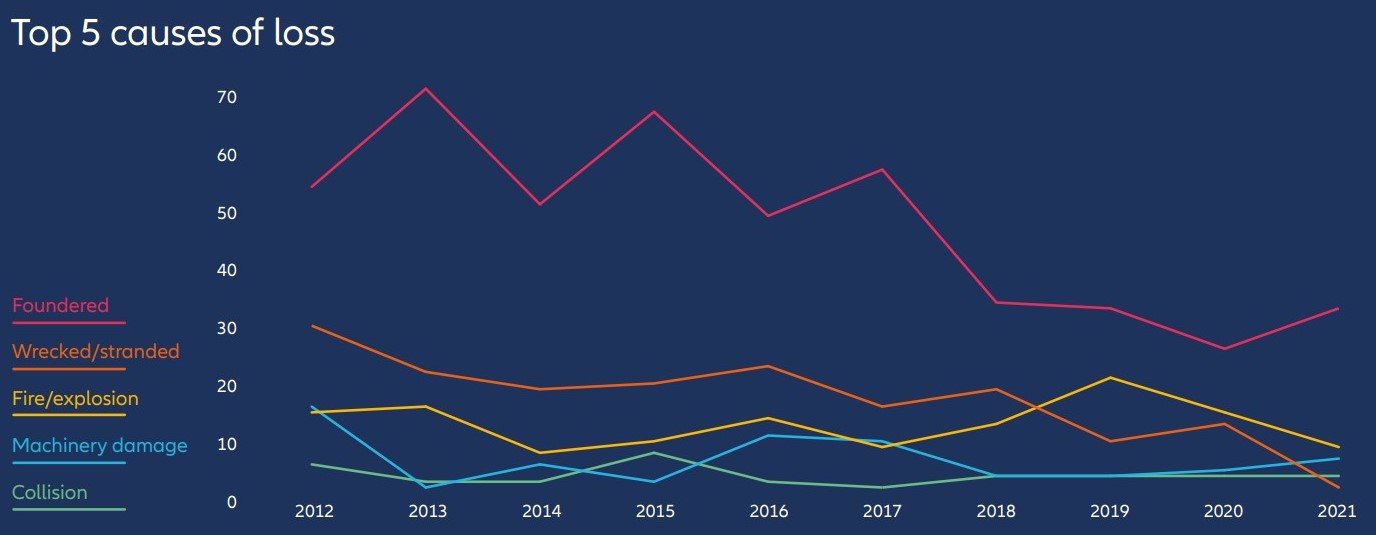
Shipping bottlenecks and port congestion
Covid-19 measures in China, a surge in consumer demand, and the Ukraine invasion have all been factors in ongoing unprecedented port congestion which puts crews, port handlers and facilities under additional pressure.
Loading and unloading vessels is a particularly risky operation, where small mistakes can have big consequences. Busy container ports have little space, while the experienced labor required to handle the containers properly is in short supply. Add in fast turnaround times and this may result in a heightened risk environment
explains Heinrich.
Climate change: transition problems
With momentum gathering behind international efforts to tackle climate change, the shipping industry is coming under increasing pressure to accelerate its sustainability efforts, the report notes, given its greenhouse gas emissions grew by around 10% between 2012 and 2018.
Decarbonization will require big investments in green technology and alternative fuels. A growing number of vessels are already switching to LNG, while other alternative fuels are under development, including ammonia, hydrogen and methanol, as well as electric-powered ships. The transition to alternative fuels will likely bring heightened risk of machinery breakdown claims, among other risks, as new technology beds down and as crews adapt to new procedures.






